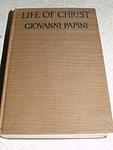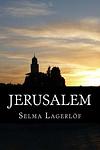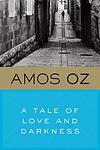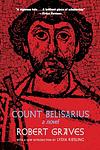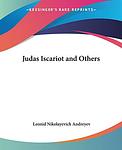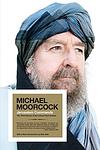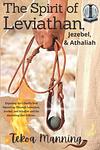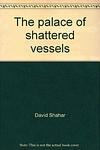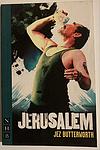The Greatest "Jerusalem" Books of All Time
Click to learn how this list is calculated.
This list represents a comprehensive and trusted collection of the greatest books. Developed through a specialized algorithm, it brings together 284 'best of' book lists to form a definitive guide to the world's most acclaimed books. For those interested in how these books are chosen, additional details can be found on the rankings page.
Genres
Countries
Date Range
Reading Statistics
Click the button below to see how many of these books you've read!
Download
If you're interested in downloading this list as a CSV file for use in a spreadsheet application, you can easily do so by clicking the button below. Please note that to ensure a manageable file size and faster download, the CSV will include details for only the first 500 books.
Download-
1. Barabbas by Par Lagerkvist
This novel tells the story of Barabbas, the man who was pardoned instead of Jesus Christ, according to the New Testament. After being released, Barabbas grapples with his newfound freedom and the guilt of being spared at the expense of Jesus. As he witnesses the rise of Christianity and the profound impact Jesus' teachings have on those around him, he struggles with his own beliefs and the meaning of his existence. The narrative explores themes of faith, redemption, and the human condition.
-
2. Ben-Hur by Lew Wallace
"Ben-Hur" is a historical novel that tells the story of Judah Ben-Hur, a Jewish prince from Jerusalem who is enslaved by the Romans after being falsely accused of an attempted assassination. After years of hardship, he becomes a successful charioteer and eventually gets a chance to take revenge on the man who wronged him. Along the way, he encounters Jesus Christ and becomes a follower. The book is a tale of adventure, betrayal, revenge, and redemption set against the backdrop of the life of Christ.
-
3. The Last Temptation of Christ by Nikos Kazantzakis
This novel presents an alternative interpretation of the life of Jesus Christ, who is depicted as a conflicted, all-too-human figure who struggles with his divine destiny. The book explores his journey through life, his friendships, his fears, and his ultimate temptation to avoid crucifixion and live a normal life. The narrative delves into the psychological and emotional aspects of his experiences, creating a complex, humanized portrayal of a traditionally divine figure.
-
4. Eichmann in Jerusalem: A Report on the Banality of Evil by Hannah Arendt
This book is a thought-provoking exploration of the trial of Adolf Eichmann, a major organizer of the Holocaust. The author argues that Eichmann was not a fanatical ideologue, but rather an ordinary individual who simply followed orders and bureaucratic procedures, highlighting the terrifying potential for evil in any system that values obedience over personal responsibility. The concept of the "banality of evil" is introduced, suggesting that horrific acts can be committed by ordinary people under certain conditions.
-
5. Operation Shylock by Philip Roth
In this intriguing novel, the protagonist, a famous writer, travels to Israel to cover the trial of a former Nazi war criminal. While there, he encounters a man who is his doppelgänger and who has been using his fame to promote a controversial political agenda, including the idea that Jews should abandon Israel and return to Europe. The narrative explores themes of identity, Jewish history, and the complexities of the Israeli-Palestinian conflict, all while blurring the line between fiction and reality.
-
6. Life of Christ by Giovanni Papini
"Life of Christ" is a comprehensive biography of Jesus Christ, exploring his life, teachings, and impact on humanity. The book delves into the historical, cultural, and spiritual context of his era, providing in-depth analysis of his miracles, parables, and relationships with his disciples and followers. The author also examines the significance of Christ's crucifixion and resurrection, aiming to provide a thorough understanding of his life and mission.
-
7. Jerusalem by Selma Lagerlöf
This book is a profound exploration of faith, tradition, and the quest for spiritual fulfillment, set against the backdrop of rural Sweden and the Holy Land in the late 19th century. It tells the story of a group of Swedish peasants, inspired by religious fervor, who decide to abandon their homeland and emigrate to Jerusalem to live a purer life in the city of Jesus. The narrative delves into the lives of these individuals, examining their motivations, struggles, and the impact of their decision on the loved ones they leave behind. Through its vivid portrayal of contrasting landscapes and cultures, the novel examines themes of community, belief, and the search for a spiritual homeland, making it a timeless tale of human aspiration and longing.
-
8. Nathan the Wise by Gotthold Ephraim Lessing
"Nathan the Wise" is a 18th-century play that explores religious tolerance and interfaith understanding. The story is set in Jerusalem during the Third Crusade and revolves around Nathan, a wealthy Jewish merchant, who is renowned for his wisdom and generosity. The narrative explores themes of religious tolerance as Nathan interacts with a Templar knight, a Christian patriarch, and the Muslim sultan Saladin. The story culminates with the revelation that the main characters, despite their different faiths, are all part of the same family, thus promoting a message of shared humanity and religious coexistence.
-
9. A Tale of Love and Darkness by Amos Oz
This book is a poignant memoir that explores the complexities of love, darkness, loss, and the endurance of the human spirit. Set against the backdrop of the end of the British Mandate for Palestine and the early years of the State of Israel, the author recounts his childhood in Jerusalem, the suicide of his mother, and his path to becoming a writer. The narrative is both a personal account and a portrait of a society in turmoil, providing a profound exploration of the individual and collective psyche.
-
10. Η Χαμένη Άνοιξη by Stratis Tsirkas
This novel unfolds in the turbulent era of World War II, exploring the lives of individuals caught in the whirlwind of global conflict and personal turmoil. Set against the backdrop of Alexandria, a melting pot of cultures and nationalities, the narrative delves into the complexities of human relationships, political intrigue, and the quest for identity amidst the chaos of war. Through the eyes of its diverse characters, the story captures the essence of a lost spring, symbolizing both the literal and metaphorical loss experienced by those living through the war and its aftermath. The novel is a poignant reflection on the cost of conflict and the enduring hope for renewal and peace.
-
11. Drifting Cities by Stratis Tsirkas
Set against the backdrop of World War II and the subsequent civil war in Greece, this novel weaves together the lives of a diverse group of characters who find themselves in Jerusalem, Cairo, and Alexandria. Through their interconnected stories, the narrative explores themes of identity, displacement, and the quest for personal and political freedom. The cities, each with their own unique atmosphere and challenges, serve as more than mere settings; they are integral to the characters' experiences, reflecting the broader historical and cultural shifts of the mid-20th century. As these individuals navigate love, betrayal, and the struggle for a sense of belonging, the book offers a rich tapestry of human resilience and the complexities of home in times of turmoil.
-
12. A Weave Of Women by E.M. Broner
This novel is a tapestry of interconnected stories centered around a group of women in Jerusalem who form a tight-knit community to confront their diverse struggles. Through their collective experiences, they tackle issues of feminism, religion, politics, and personal identity. As they weave their lives together, the women create a space that allows for healing, growth, and the reimagining of traditional roles, challenging the patriarchal structures of their society. The narrative is a celebration of female solidarity and empowerment, highlighting the importance of storytelling and the strength found in communal bonds.
-
13. Count Belisarius by Robert Graves
This historical novel brings to life the Byzantine Empire through the eyes of its most celebrated general, Belisarius. Renowned for his loyalty and military genius, the protagonist navigates the treacherous waters of political intrigue, betrayal, and warfare in an attempt to serve his emperor while maintaining his own honor. Set against the backdrop of the 6th century, the narrative not only explores the complexities of Belisarius's military campaigns against the Persians, Vandals, and Goths but also delves into his personal life, highlighting his relationship with his wife Antonina and his dealings with the cunning Empress Theodora. Through its detailed portrayal of ancient warfare, political maneuvering, and the human condition, the novel offers a vivid reimagining of a pivotal period in history.
-
14. Judas Iscariot by Leonid Andreyev
The book presents a reimagining of the character of Judas Iscariot, traditionally known as the betrayer of Jesus Christ. It delves into the psychological and moral complexities of Judas, exploring his inner turmoil, motivations, and the factors that may have led him to commit the act of betrayal. The narrative seeks to humanize Judas, offering a nuanced perspective that challenges the conventional vilification he has received throughout history. Through this character study, the book examines themes of guilt, redemption, and the nature of evil, ultimately raising questions about free will and the role of individuals within the grander schemes of destiny and divine plans.
-
15. Jerusalem Commands by Michael Moorcock
In "Jerusalem Commands," readers are transported through a fantastical and surreal narrative that follows the adventures of Colonel Pyat, an unreliable and often delusional protagonist. Set against the backdrop of the early 20th century, the novel weaves through the chaos of a world between wars, touching upon themes of imperialism, addiction, and the quest for identity. Pyat's journey is marked by a series of escapades and misadventures that take him from Europe to Africa, exposing the dark underbelly of colonialism and the human psyche. The book is the third in a series, characterized by its rich historical tapestry and a protagonist who is as charismatic as he is morally ambiguous, leaving readers to question the very nature of truth and history.
-
16. A History of the Crusades by Stephen Runciman
This book offers a comprehensive and detailed examination of the Crusades, a series of religious wars fought in the medieval period. The author delves deep into the political, economic, and social circumstances that led to the wars, the key figures involved, and the long-lasting effects on both the Christian and Muslim worlds. The narrative is both scholarly and engaging, providing a balanced perspective on one of history's most complex and controversial periods.
-
17. Jerusalem Delivered by Torquato Tasso
The epic poem unfolds during the First Crusade, depicting Christian knights led by Godfrey of Bouillon as they lay siege to Jerusalem, aiming to recapture the holy city from Muslim control. The narrative weaves together themes of love, valor, and chivalry, with a cast of characters that includes the brave knight Rinaldo and the enchanting sorceress Armida. As the warriors confront various supernatural and earthly challenges, the poem explores the conflict between Christian duty and personal passion, ultimately celebrating the virtues of heroism and piety in the quest for divine providence and the triumph of Christian faith.
-
18. Athaliah by Jean Racine
"Athaliah" is a classic French tragedy that revolves around the eponymous character, a queen who has seized the throne of Judah and is determined to eradicate the Davidic line to secure her power. The play explores themes of tyranny, faith, and divine justice, as Athaliah's reign of terror is challenged by the discovery of a surviving heir, the young Joash, who has been secretly raised in the temple by the high priest Jehoiada. As the plot unfolds, the characters navigate a tense and dangerous political landscape, leading to a dramatic confrontation between the forces of despotism and righteousness, ultimately culminating in a resolution that reinforces the providential order.
-
19. Clarel by Herman Melville
This epic poem, one of the longest in American literature, explores the profound complexities of faith and doubt through the spiritual journey of its titular character, a young American student of divinity. Set against the backdrop of a pilgrimage in the Holy Land, the narrative delves into the interactions and philosophical dialogues between a diverse cast of characters, each representing different facets of religious and existential thought. The protagonist's quest for meaning is fraught with intellectual and emotional turmoil, reflecting the author's own meditations on belief, morality, and the human condition in the post-Civil War era.
-
20. The Palace Of Shattered Vessels by David Shahar
The book is a rich tapestry of life in Jerusalem during the British Mandate period, weaving together the stories of a diverse cast of characters, from a young Jewish boy to an aging British consul. Set against the backdrop of a city steeped in history and conflict, the narrative explores themes of love, loss, and the complexities of human relationships. As the characters' lives intersect in unexpected ways, the novel delves into the cultural and political tensions of the time, painting a vivid portrait of a society on the brink of monumental change. Through its lyrical prose and intricate storytelling, the book captures the essence of Jerusalem's enduring mystique and the fragile beauty of human experience.
-
21. Jerusalem The Golden by Margaret Drabble
"Jerusalem The Golden" follows the life of a young woman named Clara who is torn between her intellectual ambitions and her desire for love and companionship. Set in 1960s London, the novel delves into Clara's struggles with her family, her relationships, and her own identity as she navigates through the changing social and political landscape of the time. With its vivid portrayal of Clara's inner conflicts and the vibrant backdrop of the city, the book offers a poignant exploration of the complexities of personal and societal expectations.
-
22. The Mandelbaum Gate by Muriel Spark
"The Mandelbaum Gate" is a gripping novel set in Jerusalem during the tense period of the 1960s. The story follows Barbara Vaughan, a young Englishwoman who becomes entangled in a web of political intrigue and personal turmoil as she navigates the complex and dangerous landscape of the divided city. With vivid descriptions and a keen eye for detail, the author explores themes of identity, religion, and the clash of cultures, creating a compelling narrative that keeps readers captivated until the very end.
-
23. Jerusalem by Jez Butterworth
"Jerusalem" is a contemporary play set in the English countryside, which vividly captures the spirit of an eccentric local daredevil, Johnny "Rooster" Byron, on St. George's Day. The story delves into the tensions between the modern world and old English folklore, as Rooster, a defiant and charismatic outsider, tells outlandish tales and provides sanctuary to the town's youth against the encroaching forces of authority and gentrification. The narrative unfolds with a mix of humor and tragedy, exploring themes of national identity, social change, and the erosion of rural traditions in the face of progress and conformity.
-
24. Jerusalem Plays Hide And Seek by Ariella Deem
"Jerusalem Plays Hide and Seek" is a children's book that takes readers on a whimsical journey through the ancient city of Jerusalem. The story follows a group of friends as they engage in a playful game of hide and seek, exploring the city's historic alleyways, vibrant markets, and sacred sites. Along the way, the children discover the rich cultural and religious tapestry that makes Jerusalem unique, learning about coexistence and the importance of friendship amidst the city's diverse communities. The book combines elements of adventure and education, offering young readers an engaging introduction to one of the world's most storied cities.
-
25. Jerusalem by Simon Sebag Montefiore
The book is a comprehensive and vivid historical narrative that delves into the rich and tumultuous past of one of the world's most contested and sacred cities. Spanning thousands of years, the work chronicles the city's inception, its central role in the development of three major monotheistic religions, and the endless series of conflicts and transformations it has undergone. Through a tapestry of personal stories, political intrigue, and religious fervor, the author weaves together a detailed account of Jerusalem's multifaceted history, revealing how this unique city has been revered, fought over, and cherished by countless generations.
Reading Statistics
Click the button below to see how many of these books you've read!
Download
If you're interested in downloading this list as a CSV file for use in a spreadsheet application, you can easily do so by clicking the button below. Please note that to ensure a manageable file size and faster download, the CSV will include details for only the first 500 books.
Download




